
Eugénie Potonié-Pierre was a French feminist who founded the Federation of French Feminist Societies in 1892.
Alaide Gualberta Beccari was an Italian feminist, republican, pacifist, and social reformer, who published the feminist journal Woman during the 1870s and 1880s.
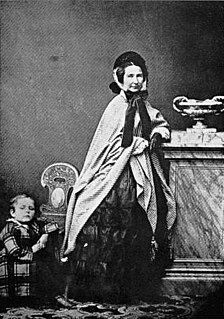
Marie Goegg-Pouchoulin (1826–1899), was a pioneer in the women's rights movement and women's peace movement in Switzerland. She has been called the first feminist in Switzerland. In 1868, she founded Association internationale des femmes (IAW), which was not only the first women's organisation in Switzerland, but also the first international women's organisation. She was a central figure in the continental activism for women's equal rights and better education.
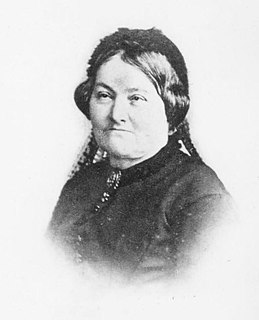
Julie von May , was a Swiss feminist. In 1868, she became the chairperson of the first women's organisation in Switzerland: Association Internationale des Femmes. She supported women suffrage, but focused on equality before the law. She has been counted as perhaps the leading feminist of her country in her generation alongside Marie Goegg-Pouchoulin.
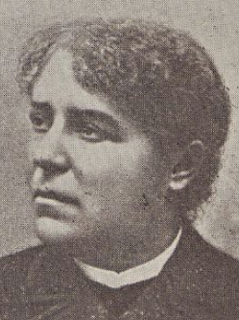
Eliska Vincent was a Utopian socialist and militant feminist in France. She argued that women had lost civil rights that existed in the Middle Ages, and these should be restored. In the late 1880s and 1890s she was one of the most influential of the Parisian feminists. She created extensive archives on the feminist movement of the 19th and early 20th centuries, but these have been lost.
Harriet Irene Dunlop Prenter was a leader in the women's rights movement in Canada. In 1921 she was among the first group of women to run as candidates in a Canadian federal election. She was a committed socialist.
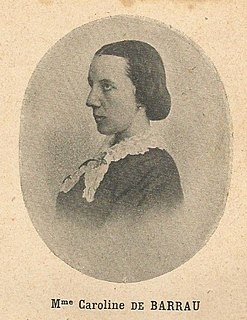
Caroline de Barrau (1828–88) was a wealthy French educationalist, feminist, author and philanthropist. She became interested in the education of girls, created a school in Paris where her daughter was taught, and encouraged her daughter and other young women to successfully apply for admission to the University of Paris, previously a male-only institution. She belonged to international feminist associations, investigated the conditions of working women in Paris, was a leader in the campaign to eliminate state-regulated prostitution, helped prostitutes reenter society after being released from prison and provided aid to abandoned infants. She was the author of several books on women's issues.

Louise Bodin was a French feminist and journalist who became a member of the steering committee of the French Communist Party.

Marthe Bigot (1878–1962) was a French primary schoolteacher, feminist, pacifist and communist.
Le Droit des femmes was a French feminist journal that appeared from 1869 to 1891. It was founded and edited by Léon Richer, and in the early days supported financially by Maria Deraismes. The newspaper supported many women's causes, but always avoided directly supporting women's suffrage. It was one of the longest running journals of its type in the 19th century.
Marianne Menzzer was a German feminist who used statistics to demonstrate discrimination against women in the workplace.

Hélène Brion was a French teacher, feminist, socialist and communist. She was one of the leaders of the French teachers' union. During World War I (1914–18) she was arrested for distributing pacifist propaganda, given a suspended sentence and dismissed from her job as a teacher. She visited Russia soon after the Russian Revolution, and wrote a book on her experiences. It was never published. She devoted much of her effort in later years to preparing a feminist encyclopedia, which was never completed or published.
Marianne Rauze was a French journalist, feminist, socialist, pacifist and communist.
The World Committee Against War and Fascism was an international organization sponsored by the Communist International, that was active in the struggle against Fascism in the 1930s. During this period Adolf Hitler came to power in Germany, Italy invaded Ethiopia and the Spanish Civil War broke out. Although some of the women involved were Communists whose priority was preventing attacks on the Soviet Union, many prominent pacifists with different ideologies were members or supporters of the committee. The World Committee sponsored subcommittees for Women and Students, and national committees in countries that included Spain, Britain, Mexico and Argentina. The Women's branches were particularly active and included feminist leaders such as Gabrielle Duchêne of France, Sylvia Pankhurst of Britain and Dolores Ibárruri of Spain.

The National Council of French Women is a society formed in 1901 to promote women's rights. The first members were mainly prosperous women who believed in using non-violent means to obtain rights by presenting the justice of the cause. Issues in the first half century included the right to vote, legal equality between husband and wife, paternal child support, social support for children, equal employment opportunity, equal pay for equal work and acquisition of citizenship on marriage. The National Council of French Women is affiliated with the International Council of Women (ICW). Now the oldest of French feminist organizations, it continues to work for causes related to the rights of women.

The French Union for Women's Suffrage was a French feminist organization formed in 1909 that fought for the right of women to vote, which was eventually granted in 1945. The Union took a moderate approach, advocating staged introduction of suffrage starting with local elections, and working with male allies in the Chamber of Deputies.

Jane Misme (1865–1935) was a French journalist and feminist. She founded the feminist journal La Française, published from 1906 to 1934, and was a member of the executive of the French Union for Women's Suffrage and the National Council of French Women.
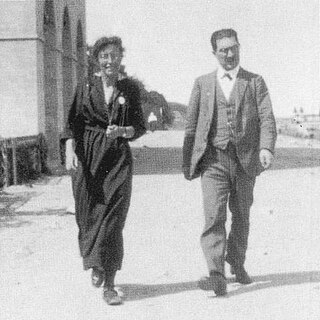
Clara Ragaz was one of the most noted Swiss feminist pacifists of the first half of the twentieth century. She was a founder of the Swiss Federation of Abstinent Women, an organization that supported the temperance movement in Switzerland. She served as the co-International chair of the Women's International League for Peace and Freedom (WILPF) from 1929 to 1946.
Ellen Robinson was a British teacher, Quaker minister, feminist and peace activist. She founded the Liverpool and Birkenhead Women's Peace and Arbitration Society (LBWPAS) and served on the council of the International Peace Bureau. She was also active with the Peace Society, the International Arbitration and Peace Association, and the Religious Society of Friends. Robinson used her background as a teacher to give frequent speeches supporting anti-war principles. In particular, she opposed British militarism of the Second Boer War in South Africa and spoke against European human rights abuses in Africa and Asia.

Virginie Griess-Traut (1814–98) was a French feminist, pacifist, and peace activist.













